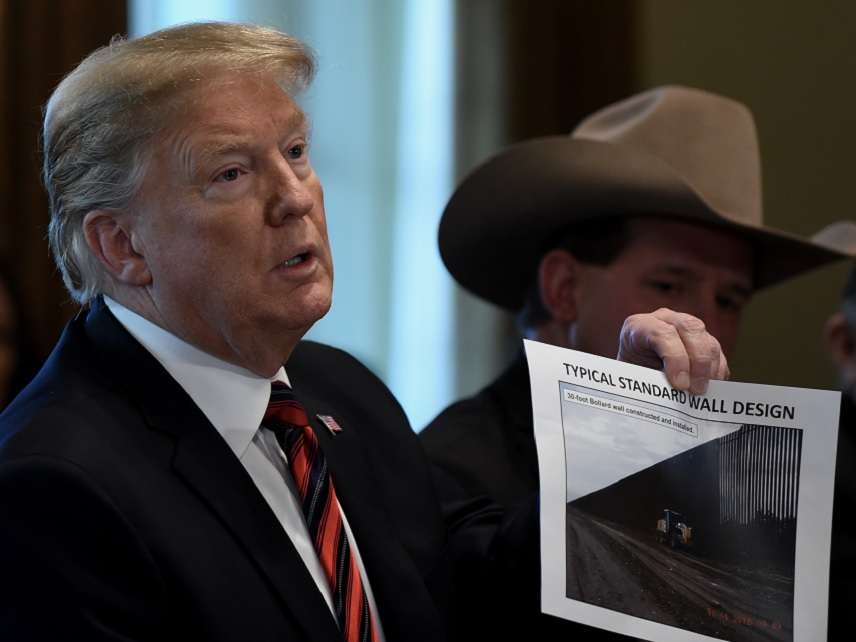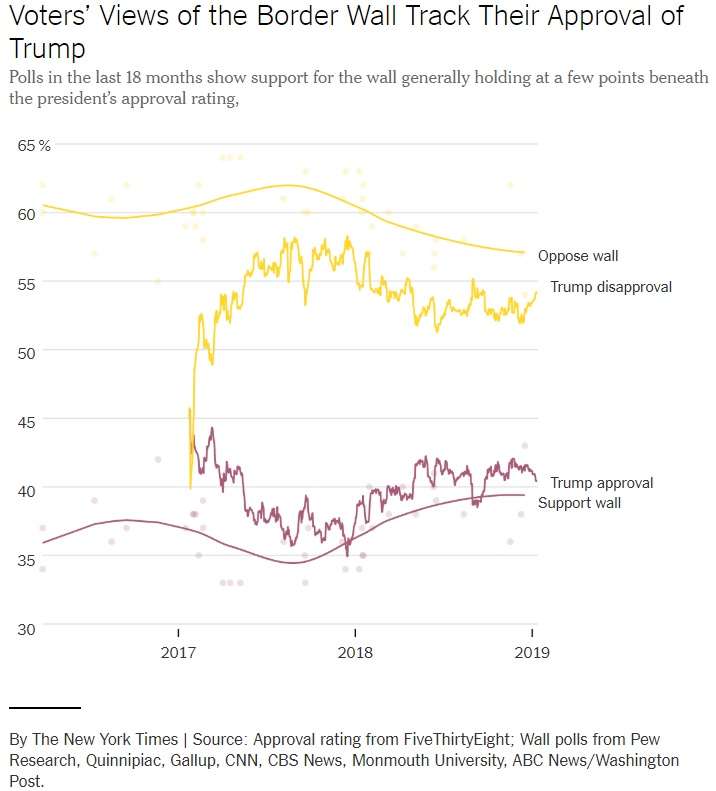'Our Porous Border' and Other Myths of Trump's Increasingly Popular Wall Mania
Marco Rubio, Ted Cruz, and other major Republicans are spreading misinformation in support of the president's fixation on a border wall.

As the government shutdown continues, it's worth underscoring that the precipitating factor—President Donald Trump's insistence that any new spending bill include somewhere around $5 billion for the construction of a border wall, barrier, or fence—is built upon a foundation of sand. The president insists that "there is a growing humanitarian and security crisis at our southern border," but the evidence of that is scant.
Over the past several years, including two during which the Republican Party controlled the White House and Congress and could have appropriated funds to build the wall that Candidate Trump promised in speech after speech (usually claiming Mexico would pay the bill), there has been no mad rush or spike in people, especially terrorists, or drugs flowing north from Mexico that justify talk of crisis, especially one that can only be addressed by building physical barriers in the middle of nowhere.
Indeed, the number of illegal immigrants in the country is at a 10-year low and the number of people caught trying to enter the country illegally between checkpoints on the Southern border is one-fourth of what it was in 2000 (see chart). Compared to decades past, the majority of illegals enter the country legally and then overstay tourist, student, or work visas. In 2016, the Department of Homeland Security said 170,000 people entered the country illegally outside of border checkpoints while 628,000 people who entered the country legally overstayed visas. Whether traveling alone or as a family, asylum seekers from Mexico, Guatemala, Honduras, and El Salvador offer themselves to authorities in order to start the application process and, even though are overwhelmingly likely to be denied asylum (more on that in a moment), voluntarily show up for court dates between 83 percent and 99 percent of the time, according to government data.
As Cato's Alex Nowratesh has documented, the terrorist risk posed by people crossing the Southern border is vanishingly small. Between 1975 and 2017, 20 foreign-born terrorists entered the country either illegally or as asylees. "[Eleven] terrorists who entered as asylum seekers murdered 9 people in terrorist attacks…. Of those 9 terrorists who entered illegally, only 3 did so along the border with Mexico." The perpetrators were ethnic Albanians from Macedonia who were brought here as children.
To the extent that drugs, especially heroin and fentanyl, flow north, they overwhelmingly enter the country by being smuggled through legal checkpoints. Building walls or fences isn't going to stop that. Nor will lying about the number of terrorists supposedly caught at the border, as White House spokeswoman Sarah Huckabee Sanders did recently. She claimed, against all evidence, that the government had caught 4,000 "known or suspected terrorists" on the Southern border in 2017; in fact, six would-be immigrants were snagged.

And yet respectable leading Republicans (no, not you, Rep. Steve King) such as Sens. Marco Rubio (R-Fla.) and Ted Cruz (R-Texas) insist, like the president, that we are suddenly so deep in crisis nothing short of a wall can fix it. Not long ago, both were Tea Party darlings whose emphasis was on reducing the size, scope, and spending of government across the board. Though both voted for a short-term spending bill in December that didn't include wall funding, they now agree that the government should not reopen until Trump gets his money.
In 2010, I remember hearing Rubio, the son of Cuban immigrants, give a speech at a Club for Growth event that raised the hair on the back of my neck because it was so emotionally powerful. He explicitly spoke not just to the wealthy grandees in the dinner hall that night but to the mostly Latino wait staff who lined the back of the room. America, he said, was a land of opportunity that has prospered materially and morally to the extent that we have been open to people coming here to work hard and pursue happiness. The future of his Republican Party, I remember him saying, depended on reaching out to newcomer immigrants and making it clear that they, like his parents, were welcome participants in the American experiment.
Early on in his Senate career, Rubio was a member of the so-called Gang of Eight, a group of senators who crafted comprehensive immigration reform that included a path to legalization for currently illegal immigrants, streamlined and expanded visas programs for both high-skill and low-skill workers, and various security measures, including increased requirements for employers to verify worker status. The Gang of Eight plan was recognized as moderate and passed the Senate overwhelmingly in 2013, by a vote of 68 to 32. The Republican House, led by Speaker John Boehner, refused to vote on the measure and it died, taking with it Rubio's commitment to immigration reform. Since that defeat—and massive abuse from increasingly nativist Republican voters, commentators, and elected officials—Rubio switched directions and fallen in line with restrictionists. He reversed his position on "dreamers," young immigrants brought here illegally as children by their parents, and has rejected a path to legal status for them. And he is currently joining in the Trump administration's demand for a wall as a precondition for reopening the government.
The new caravan forming in Honduras is proof that what is happening at the border is a crisis. Primarily a humanitarian one. Our porous border is luring more families with children to undertake a dangerous journey. Placing children in danger & overwhelming our asylum system.
— Marco Rubio (@marcorubio) January 12, 2019
It's nice to see that some humanity remains in Rubio—he says the current "crisis" is "primarily a humanitarian one"—but he is wrong to imply that something has changed in our border policies or large-scale immigration flows.
In fact, about 50 percent of all asylum claims between 2011 through 2016 were denied. The denial rates are far, far higher than average for people from countries that are causing so much anxiety now. Over that time period, 90 percent of asylum claims for applicants from Mexico were denied and similarly long odds were faced by Salvadorans (83 percent denied), Hondurans (80 percent), and Guatemalans (77 percent). To the extent that the number of people, particularly families, applying for asylum has increased, that's primarily driven by events in home countries, not changes in our immigration policies. Since 2016, no one inside or outside of the United States is under the impression that we are rolling out the red carpet for the world's wretched refuse. Indeed, President Trump has tightened up asylum rules so that those presenting themselves at the border are even less likely to be approved. If the recent deaths of migrant children have highlighted problems with Customs and Border Protection (CBP), those problems date back to well before Donald Trump took office. They constitute not a crisis to be solved by a border wall or the declaration of a national emergency but better oversight and better use of either existing or increased resources.
For his part, Ted Cruz has reintroduced his "El Chapo Act," which
would reserve any amounts forfeited to the U.S. Government as a result of the criminal prosecution of "El Chapo" (formally named Joaquin Archivaldo Guzman Lorea) and other drug lords for border security assets and the completion of the wall along the U.S.-Mexico border…
Currently the U.S. Government is seeking the criminal forfeiture of more than $14 billion in drug proceeds and illicit profits from El Chapo, the former leader of the Sinaloa drug cartel who was extradited to the U.S. to face criminal prosecution for numerous alleged drug-related crimes, including conspiracy to commit murder and money laundering.
Cruz has released a video, complete with animated graphics, to explain how this all would work.
Whatever else you can say about Cruz's video, the Drug Enforcement Administration (DEA) is emphatic that virtually all heroin and fentanyl enters the country through legal checkpoints. In its most recent Drug Threat Assessment, the agency says,
A small percentage of all heroin seized by [Customs & Border Patrol] along the land border was between Ports of Entry (POEs)…. The majority of the flow is through [privately owned vehicles] entering the United States at legal ports of entry, followed by tractor-trailers, where the heroin is co-mingled with legal goods.
Donald Trump's insistence that there is a crisis on the border between the United States and Mexico has won over more than Rubio and Cruz. Rep. Mark Meadows (R-Tenn.), the leader of the so-called Freedom Caucus in the House of Representatives, has gone on the record calling for extraordinary measures, including the use of asset forfeiture and a national emergency to build the president's wall:
Democrats continue to refuse to negotiate in good faith or appropriate any money for border barriers. If they won't compromise, POTUS should use asset forfeiture money or other discretionary fees to start construction. If not, he should declare a national emergency. It's time.
— Mark Meadows (@RepMarkMeadows) January 11, 2019
The Freedom Caucus was founded in 2015 and its mission statement reads in part:
The House Freedom Caucus gives a voice to countless Americans who feel that Washington does not represent them. We support open, accountable and limited government, the Constitution and the rule of law, and policies that promote the liberty, safety and prosperity of all Americans.

There is evidence that Trump's insistence both on a border crisis and the need for a wall is slowly wearing down opposition, especially given the uncomfortable fact that leading Democrats such as Speaker of the House Nancy Pelosi (Calif.) and Senate Minority Leader Charles Schumer (N.Y.) have voted for barriers in recent memory and they continue to speak the language of increasing "border security." Although Trump continues to have historically low approval ratings, support for a wall has actually risen slightly over the past six months or so. Call it the art of the deal or whatever you want, but the guy wears people out until they give him what he wants.
This is the peculiar genius of Donald Trump, and it's not trivial. More so than any other politician on the scene, he is able to set the terms of the national conversation. He may well "lose" the shutdown in the sense that he and the Republicans may suffer losses in 2020 or beyond. But there's every reason to believe that by the end of 2019, some sort of groundbreaking will have begun on a wall (or fence, or whatever) designed to address a crisis that doesn't exist.
